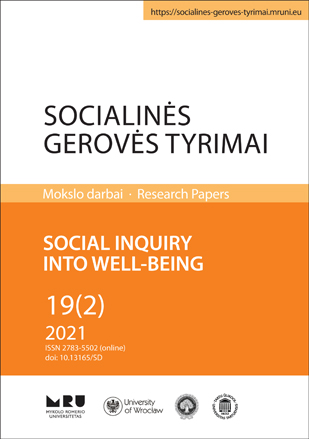VERSLO ORGANIZACIJŲ VIDURINIO LYGIO VADOVŲ DVASINGUMO LYDERYSTĖJE IŠGYVENIMAS IR ĮPRASMINIMAS
THE EXPERIENCING AND MEANINGFULNESS OF SPIRITUALITY IN THE LEADERSHIP OF MIDDLE-LEVEL MANAGERS IN BUSINESS ORGANIZATIONS
Author(s): Laima Nakvosaitė, Jolanta SondaitėSubject(s): Psychology, Organizational Psychology, Management and complex organizations
Published by: Mykolas Romeris University
Keywords: middle-level managers; spirituality in business; qualitative research; thematic analysis;
Summary/Abstract: Changes in the scope of leadership in recent decades have led to the search for new management methods in relationships with subordinates. One of these methods is the application of spirituality in leadership. Although the construct of spiritual leadership has been of interest to researchers since the 1980s, previous research has focused on determining the impact of spiritual leadership on individual and organizational outcomes, but little has been done on research to identify and agree on the behaviors of a spiritual leader. Conceptualizing and defining spirituality and spiritual leadership is perhaps the most problematic and challenging task for the paradigmatic development of an emerging field. There is no commonly agreed definition of spiritual leadership or spirituality at work. The lack of a common definition and the unclear boundaries between workplace spirituality and leadership show that the field of spiritual leadership is still in development, and disputes over the difficulty of defining the construct have led many to question whether spiritual leadership and workplace spirituality deserve the attention they have received. Therefore, exposing the behavior of a spiritual leader is important for deepening the overall understanding of the concept of spiritual leadership.It is also important to understand that a leader in an organization can be not only a top, but also a middle manager, who communicates directly with subordinates and is an essential link between top managers, who are more concerned with common strategic issues and directions of the organization, and employees, who perform specific tasks.However, despite their very significant role in organizations, no research has been found in the scientific literature investigating the spirituality of middle managers. Thus, in this context, it is appropriate to explore the experiencing and the meaningfulness of spirituality in the leadership of managers at this level by choosing a qualitative approach to the study that would better reveal leaders’ deep understanding of this phenomenon.The aim of this work is to analyze the experiencing and the meaningfulness of spirituality in the leadership of middle-level managers in business organizations.The objectives of this study are: (1) to reveal middle-level managers’ experiencing of spiritual leadership in business organizations; and (2) to reveal the meaningfulness of the spirituality of middle-level managers in the leadership of business organizations.This study sought to answer the questions: (1) how do middle managers experience spirituality in leadership; and (2) how do middle managers assess the meaning of spirituality in leadership?This study used criterion sampling. Given that the aim of the study was to analyze the experiencing and meaningfulness of the spirituality of middle managers in leadership in business organizations, certain criteria were identified in the selection of study participants. Study participants were persons currently working as middle managers in business organizations, and six eligible participants participated in the study.Data were collected through a semi-structured interview questionnaire developed by the researchers. The data obtained during the interviews were transcribed and encoded. Given that spirituality in leadership is a relatively little-studied construct, it is examined in this study through the individual experience and understanding of middle managers to reveal their deep experiences and the concept of meaningfulness in spiritual leadership. Therefore, to achieve these goals, a method was chosen that allowed a thorough, in-depth study and that ensured that the data collected remained individual. Thus, a qualitative method of thematic analysis was chosen for the analysis of the data obtained during the interviews. A realistic approach was followed in this study, as well as inductive methods of analysis and semantic coding and topic development methods. The focus was on the participants’ experiences in a real environment in order to remain as close as possible to the meanings of the data expressed by the participants, and the research data was worked on first; only later was the literature examined.The results of this study show that middle-level managers’ experiencing of spirituality in leadership in business organizations has been revealed through topics such as comprehensively qualitative communication, constructive problem solving, and fostering human values. This revealed the human qualities inherent in spirituality in leadership, such as: communicating with employees, listening, providing clear information, openness, maintaining close contact, problem solving, caring for employees’ well-being, assistance, respect, honesty, and trust. Meanwhile, the meaningfulness of spirituality in the leadership of middle-level managers in business organizations was revealed through topics such as understanding the concept of spirituality and meeting the expectations of managers. This revealed spiritual leader-specific behaviors such as: deepening one’s understanding of the concept of spirituality, recognizing that leadership can be and is spiritual, equal treatment of employees and other people, maintaining teamwork, and seeking and maintaining quality feedback.
Journal: Socialinės gerovės tyrimai
- Issue Year: 19/2021
- Issue No: 2
- Page Range: 83-101
- Page Count: 19
- Language: Lithuanian

